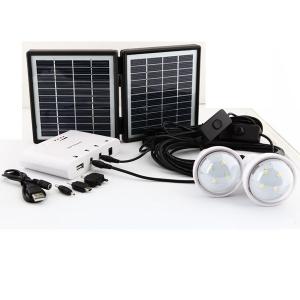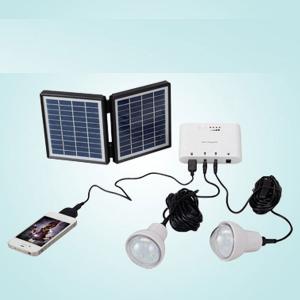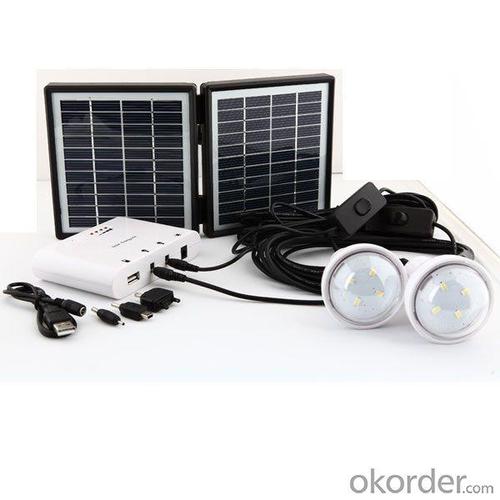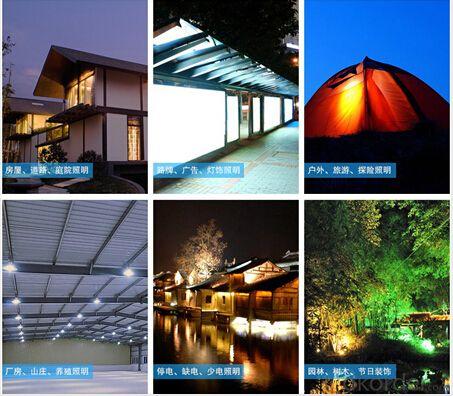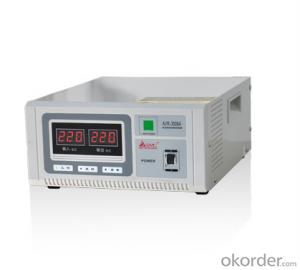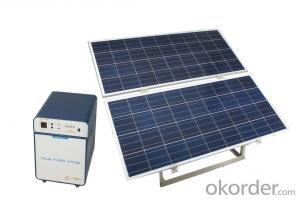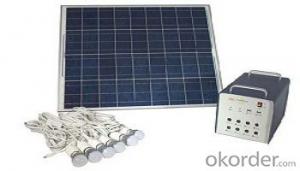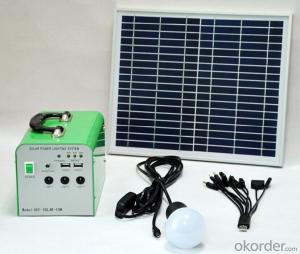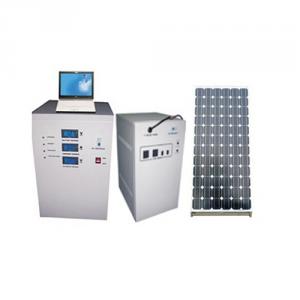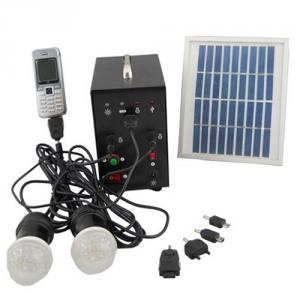Solar Energy Systems Melbourne FL:3.4w Solar Lighting System with Mobile Charge, 3.4w Solar Panel, 2600mAh Battery, 2 LED Globe Bulbs
- Loading Port:
- Shenzhen
- Payment Terms:
- TT/LC
- Min Order Qty:
- 100Sets set
- Supply Capability:
- 20000 SETS Per Month set/month
OKorder Service Pledge
OKorder Financial Service
You Might Also Like
This 3.4w solar lighting system with mobile charge 3.4w solar panel 2600mAH 7.4V and 2 led globe bulbs. This portable solar energy system can generate power for 2 LED bulbs, it can work 10 to 20 hours every day.
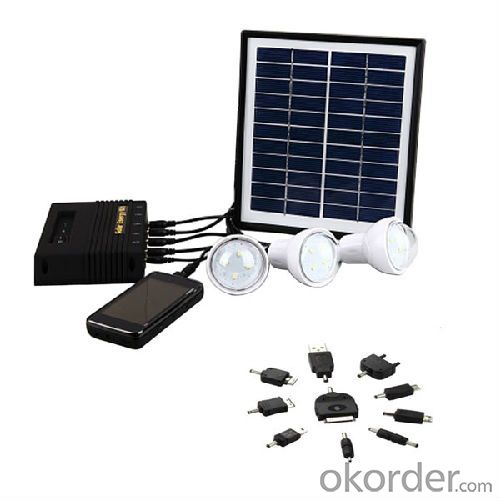
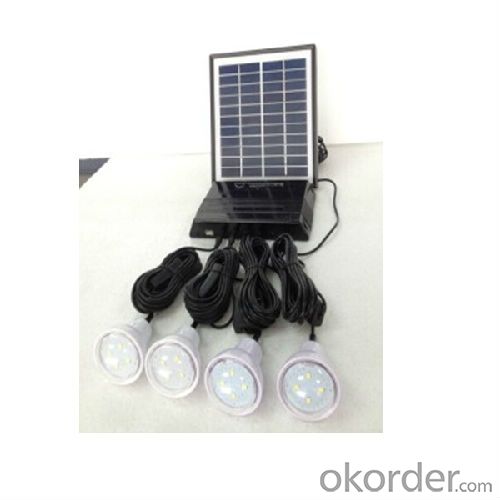
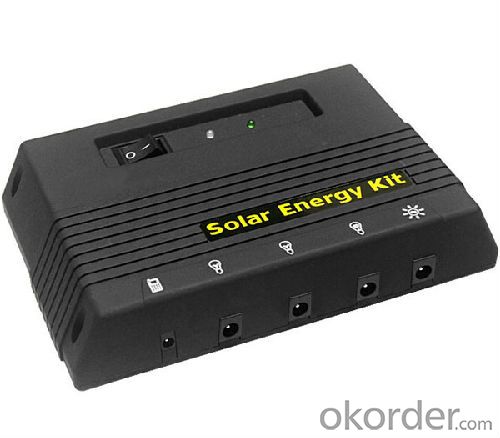
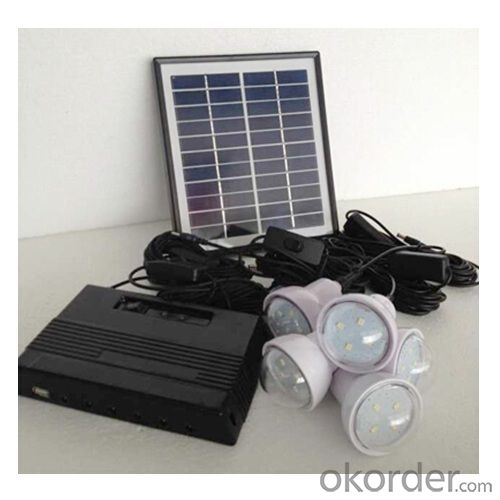
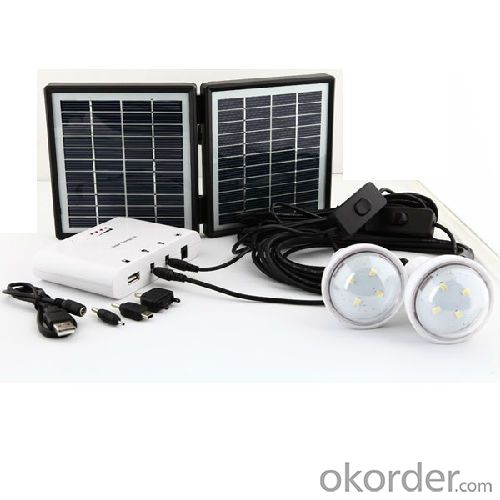
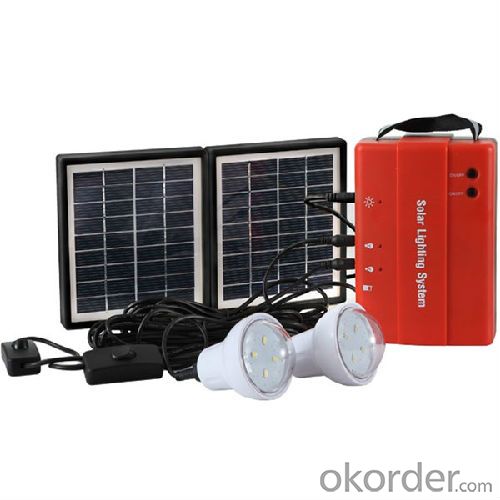
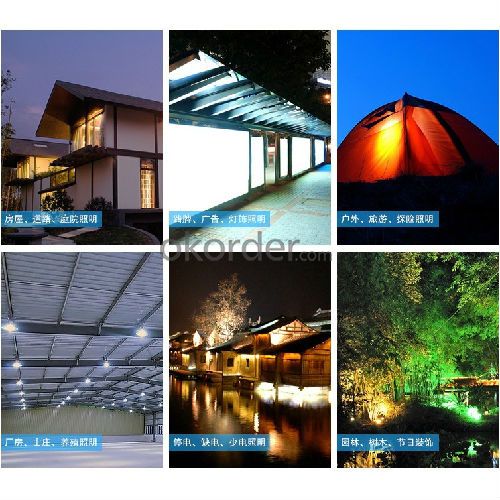
Parameter
1, Rechargeable by solar or AC adaptor;
2 With Mobile phone charging function (3 standard charging connectors for Nokia6101,Sony EricssonK750 and Mini USB)
3. Housing material: ABS;
4. Battery: 2.6AH/3.7V*2pcs Li-ion ;
5. Lighting time: 20 hours after fully charged; 10hrs after one day charge by sun.
6. Accessory: two bulbs with 5M long cable(with switch on the cable)
7.Over charge and over discharge protection.
Feature
Mini Solar Lighting System With 2 Lights (Lithium Battery)
1, Foldable solar panels
2, 4 LED indicators
3, USB mobile charging
4, CE,Design Patent
Usage/Applications
Rural homes, campers, fishermen, outdoor campaigns or activities, etc. Remote area, mountainous area, desert area, grassland area,
Village, country area, Camping, outdoor activities, travel, Lighting at night.
Customized options
1. OEM/ODM available;
2. It's also available to customize your own solar lighting systems, solar lanterns, or any solar lighitng products by giving us solar lights picture / 3D draft / technical datas.
Packing & Delivery
Package:
1* solar panel
1* portable system box
2* LED bulbs with on/off button on cable
inner box size: 335*255*84mm
10pcs/carton
carton size: 525*350*450mm
Delivery:
|
Shipping Service |
Estimated Delivery Time |
|
DHL |
2-8 business days |
|
FedEx |
3-8 business days |
|
TNT |
2-10 business days |
|
UPS |
1-7 business days |
|
EMS |
6-14 business days |
|
ePacket |
7-12 business days |
|
China Post Air Mail |
7-15 business days |
|
China Post SAL |
14-30 business days |
|
Air freight |
3-10 business days |
|
By Sea |
30-40 business days |
1. 3-5 business days for Sample Orders; 7-30 business days for Bulk Orders for Bulk Orders.
2. "Business days" means Monday-Friday, excluding holidays.
3. DHL and UPS cannot ship to military or P.O. boxes address
4. The Shipping Service above is for reference only, for any other questions, please feel free to contact us.
Factory
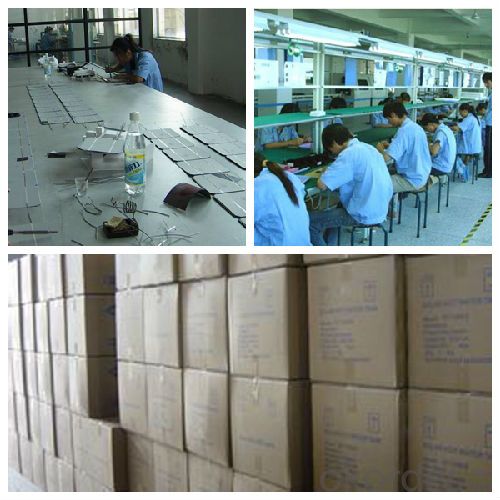
- Q: Can solar energy systems be used for powering remote cabins or cottages?
- Yes, solar energy systems can definitely be used to power remote cabins or cottages. In fact, solar power is an ideal choice for off-grid locations as it provides a sustainable and reliable source of electricity without the need for a connection to the utility grid. Solar energy systems consist of solar panels that convert sunlight into electricity, a charge controller to regulate the charging of batteries, and an inverter to convert the stored energy from the batteries into usable AC power. This setup allows the solar panels to capture sunlight during the day and store the excess energy in batteries for use during the night or on cloudy days. Remote cabins or cottages often lack access to traditional power sources, making solar energy systems a perfect solution. These systems can be specifically designed to meet the energy demands of the cabin, taking into account factors such as the number of appliances, lights, and other electrical devices used. By properly sizing the solar panels and battery capacity, it is possible to provide enough power to meet the needs of the cabin occupants. Moreover, solar energy systems are low maintenance and can last for several decades with proper care. This makes them a cost-effective and reliable source of power for remote cabins or cottages, eliminating the need for noisy and polluting diesel generators or the hassle of transporting fuel to the remote location. Additionally, solar energy systems can be combined with other renewable energy sources such as wind turbines or micro-hydro systems to create hybrid power systems, ensuring a continuous power supply even during periods of low sunlight. In conclusion, solar energy systems are an excellent choice for powering remote cabins or cottages. They provide a sustainable, reliable, and low-maintenance source of electricity, allowing occupants to enjoy the comforts of modern living even in remote locations.
- Q: Can solar energy systems be installed on flat surfaces?
- Yes, solar energy systems can be installed on flat surfaces such as roofs or ground-mounted structures.
- Q: How do solar energy systems impact the energy efficiency of a home?
- Solar energy systems have a significant impact on the energy efficiency of a home. By harnessing the power of the sun, these systems generate electricity that can be used to power various appliances and devices within the household. This reduces the dependence on traditional energy sources, such as fossil fuels, and helps in reducing greenhouse gas emissions. One of the key advantages of solar energy systems is that they provide a clean and renewable source of power. By utilizing the abundant sunlight, homeowners can generate their own electricity, thereby reducing their reliance on the grid. This not only helps in conserving natural resources but also lowers the overall carbon footprint of the household. Another way in which solar energy systems enhance energy efficiency is through the concept of net metering. Net metering allows homeowners to sell excess electricity generated by their solar panels back to the grid, thereby offsetting their energy consumption during times when the sun is not shining. This ensures that the energy produced by the solar panels is efficiently utilized and not wasted. Furthermore, solar energy systems often come with advanced monitoring and control features that allow homeowners to track their energy usage in real-time. This enables them to identify areas of high energy consumption and take necessary steps to optimize their energy usage. By making informed decisions based on this data, homeowners can further enhance the energy efficiency of their homes. In addition to reducing electricity bills, solar energy systems also increase the value of a home. Studies have shown that homes equipped with solar panels tend to sell at a higher price compared to those without. This is because potential buyers are attracted to the idea of reduced energy costs and an environmentally friendly lifestyle. Overall, solar energy systems play a crucial role in improving the energy efficiency of a home. By harnessing the power of the sun, homeowners can reduce their reliance on traditional energy sources, lower their carbon footprint, and save money on electricity bills. With continuous advancements in solar technology, these systems are becoming increasingly efficient and affordable, making them a viable option for homeowners looking to make their homes more energy-efficient.
- Q: Do solar energy systems require grounding?
- Grounding is crucial for solar energy systems, as well as any other electrical system, for safety reasons. It serves as a protection against electrical faults, lightning strikes, and other potential dangers. In a solar energy system, grounding is typically accomplished by connecting all metal components, such as solar panels, inverters, and racking systems, to a common ground. This is done by using grounding wires or cables that are linked to a grounding electrode, like a grounding rod or a metal water pipe. Grounding plays various important roles in solar energy systems. Firstly, it safeguards against electrical shock hazards by providing a safe pathway for electrical currents in case of a fault or malfunction. Additionally, grounding helps prevent damage to the system by diverting lightning strikes or other electrical surges away from sensitive components. Moreover, grounding is mandatory according to electrical codes and regulations. These codes ensure the safe installation and operation of solar energy systems, adhering to industry standards. Failure to comply with grounding requirements can lead to safety risks, equipment harm, or even legal consequences. In conclusion, grounding is an essential and significant aspect of solar energy systems. It guarantees the system's and its operators' safety, shields against electrical faults and lightning strikes, and ensures adherence to electrical codes and regulations.
- Q: Can solar energy systems be used in military applications?
- Yes, solar energy systems can be used in military applications. They offer a reliable and sustainable source of power that can be used to operate various equipment and facilities in remote or off-grid locations. Solar panels and batteries can be integrated into military bases, vehicles, and portable devices, providing energy independence and reducing reliance on traditional fuel sources. Additionally, solar energy systems offer a tactical advantage by minimizing the logistical challenges associated with fuel transportation and storage, making them an attractive option for military operations.
- Q: Can solar energy systems be used in cold storage facilities?
- Yes, solar energy systems can be used in cold storage facilities. Solar panels can generate electricity to power refrigeration systems and other equipment in cold storage facilities. Additionally, solar thermal systems can provide heat for defrosting purposes or to maintain optimal temperatures inside the facility. Implementing solar energy systems in cold storage facilities can help reduce operating costs and carbon emissions.
- Q: Can solar panels be installed on RVs or boats?
- Yes, solar panels can be installed on both RVs and boats. In fact, solar panels are increasingly popular for these applications as they provide a sustainable and reliable source of electricity while on the move. The panels can be mounted on the roof or in other suitable locations, and they help to charge the batteries and power various appliances and systems on board.
- Q: How does the efficiency of solar panels vary across different panel sizes?
- The efficiency of solar panels can vary across different panel sizes due to several factors. Generally, larger panels tend to have higher efficiency ratings compared to smaller panels. This is primarily because larger panels have a larger surface area to capture sunlight, allowing them to generate more electricity. Larger solar panels can accommodate more solar cells, which are responsible for converting sunlight into electricity. These additional cells increase the overall power output of the panel, resulting in higher efficiency. Moreover, larger panels often have better current and voltage ratings, enabling them to produce more electricity even under low light conditions. However, it is important to note that the efficiency of solar panels is not solely determined by their size. The overall quality and technology of the panel also play a significant role. Different manufacturers may have varying levels of technological advancements, materials, and manufacturing processes, which can impact the efficiency of their panels. Additionally, the efficiency of solar panels may also be influenced by external factors such as temperature, shading, and angle of installation. Higher temperatures can decrease the efficiency of solar panels, while shading from trees or buildings can significantly reduce their performance. Moreover, the angle at which the panels are mounted can affect their exposure to sunlight, thereby impacting their overall efficiency. In summary, while larger solar panels generally have higher efficiency ratings due to their larger surface area and increased power output, other factors such as panel quality, external conditions, and installation angle can also impact the efficiency of solar panels across different sizes. It is crucial to consider all these factors when choosing the appropriate panel size for a specific application to ensure optimal performance and energy generation.
- Q: Can solar energy systems be used for powering electric vehicle carpooling services?
- Yes, solar energy systems can be used to power electric vehicle carpooling services. Solar energy systems generate electricity by converting sunlight into usable energy, which can be used to charge electric vehicles. By installing solar panels on the carpooling service's parking lot or charging stations, the vehicles can be charged directly from the sun's energy. This not only reduces the carbon footprint of the carpooling service but also helps in promoting renewable energy usage. Additionally, solar-powered carpooling services can benefit from reduced electricity costs as they would rely less on the grid for charging the vehicles.
- Q: Can solar energy systems be used for powering construction or building sites?
- Yes, solar energy systems can certainly be used for powering construction or building sites. In fact, they offer numerous advantages over traditional power sources. Solar panels can be installed on rooftops or other available areas of the site to capture sunlight and convert it into electricity. This renewable energy can be used to power various equipment and tools required for construction, including lighting systems, power tools, and machinery. Using solar energy systems on construction sites can lead to significant cost savings. With no fuel costs and minimal maintenance requirements, solar power can help reduce the overall energy expenses associated with construction projects. Additionally, solar panels have a long lifespan and can be reused in future projects, making them a worthwhile investment. Furthermore, solar energy systems are environmentally friendly and produce zero greenhouse gas emissions during operation. By utilizing solar power, construction sites can reduce their carbon footprint and contribute to a greener and more sustainable future. This aligns with the increasing focus on sustainable construction practices and helps meet environmental regulations and certifications. It's worth noting that solar energy systems can also be combined with other renewable technologies, such as battery storage systems, to ensure a continuous power supply even during cloudy days or at night. This enables construction sites to have a reliable and uninterrupted power source, reducing dependence on traditional energy grids. In conclusion, solar energy systems are a viable and efficient option for powering construction or building sites. They offer cost savings, environmental benefits, and the ability to operate independently of the grid. As the construction industry continues to prioritize sustainability, the adoption of solar power is likely to become more widespread in the future.
1. Manufacturer Overview
| Location | |
| Year Established | |
| Annual Output Value | |
| Main Markets | |
| Company Certifications |
2. Manufacturer Certificates
| a) Certification Name | |
| Range | |
| Reference | |
| Validity Period |
3. Manufacturer Capability
| a) Trade Capacity | |
| Nearest Port | |
| Export Percentage | |
| No.of Employees in Trade Department | |
| Language Spoken: | |
| b) Factory Information | |
| Factory Size: | |
| No. of Production Lines | |
| Contract Manufacturing | |
| Product Price Range | |
Send your message to us
Solar Energy Systems Melbourne FL:3.4w Solar Lighting System with Mobile Charge, 3.4w Solar Panel, 2600mAh Battery, 2 LED Globe Bulbs
- Loading Port:
- Shenzhen
- Payment Terms:
- TT/LC
- Min Order Qty:
- 100Sets set
- Supply Capability:
- 20000 SETS Per Month set/month
OKorder Service Pledge
OKorder Financial Service
Similar products
Hot products
Hot Searches
Related keywords
